
Verona is a city on the River Adige in Veneto, Italy, with 258,031 inhabitants. It is one of the seven provincial capitals of the region, and is the largest city municipality in the region and in northeastern Italy. The metropolitan area of Verona covers an area of 1,426 km2 (550.58 sq mi) and has a population of 714,310 inhabitants. It is one of the main tourist destinations in Northern Italy because of its artistic heritage and several annual fairs and shows as well as the opera season in the Arena, an ancient Roman amphitheater.

Ezzelino III da Romano was an Italian feudal lord, a member of the Ezzelini family, in the March of Treviso. He was a close ally of the emperor Frederick II, and ruled Verona, Vicenza and Padua for almost two decades. He became infamous as a cruel tyrant, and was, in fact, the most "notorious" of the "early tyrants".
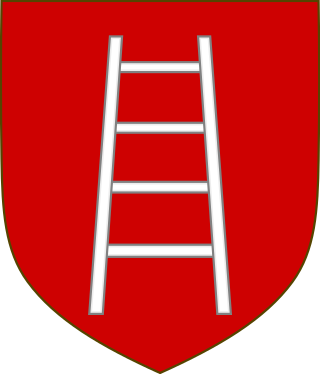
The House of Della Scala, whose members were known as Scaligeri or Scaligers, was the ruling family of Verona and mainland Veneto from 1262 to 1387, for a total of 125 years.

Cangrandedella Scala was an Italian nobleman, belonging to the della Scala family that ruled Verona from 1308 until 1387. He was indeed one of the most important characters at the time of signorie during the period where italy divided in comuni. Now perhaps best known as the leading patron of the poet Dante Alighieri and featuring prominently in Giovanni Boccaccio's almost contemporary Decameron, Cangrande was in his own day chiefly acclaimed as a successful warrior and autocrat. Between becoming sole ruler of Verona in 1311 and his death in 1329 he took control of several neighbouring cities, notably Vicenza, Padua and Treviso, and came to be regarded as the leader of the Ghibelline faction in northern Italy.

The history of Verona traces its origins from the foundation of the first settlement on San Pietro hill, probably dating back to the Neolithic period, to the present day: the evidence of such an ancient and rich history can be seen in the landmarks, in the streets and squares, even underground, where the ruins and artifacts of ancient prehistoric and particularly Roman civilizations emerge. It was especially during Roman rule that Verona prospered to become one of the most important cities in northern Italy, a status it maintained even after the fall of the Roman Empire, when the city was repeatedly elevated to capital of Roman-Barbarian kingdoms.
Pietro Colonna was an Italian cardinal.

Alberto I della Scala was lord of Verona from 1277, a member of the Scaliger family.
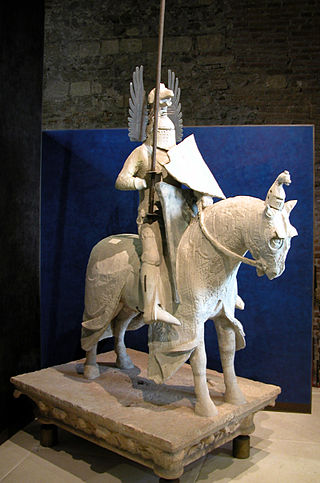
Mastino II della Scala was lord of Verona. He was a member of the famous Scaliger family of Northern Italy.

Ubertino Ida Carrara, called Novello and better known as Ubertinello, was the Lord of Padua from 1338 until his death.

Alboino I della Scala was the Scaliger Lord of Verona from 1304 until his death.
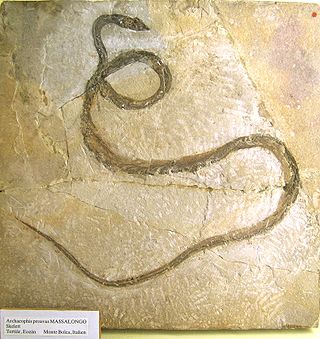
Bolca is a village in the Veneto, on the southern margin of the Italian Alps. It is a frazione of the comune of Vestenanova, in the province of Verona. The area is famous for the marine fossils from the lagerstätte of Monte Bolca. It was one of the first fossil sites with high quality preservation known to Europeans, and is still an important source of fossils from the Eocene.

Alberto II della Scala was lord of Verona from 1329 until his death. He was a member of the famous Scaliger family of northern Italy.
The Lords of Verona ruled the city from 1260 until 19 October 1387 and for ten days in 1404. The lordship was created when Mastino I della Scala was raised to the rank of capitano del popolo from that of podestà. His descendants, the Scaliger, all Ghibellines, ruled the city and its vicinity as a hereditary seigniory for a century and a half, during which the city experienced its golden age.

Bartolomeo I della Scala was lord of Verona from 1301, a member of the Scaliger family and protector of Dante during his exile from Florence.
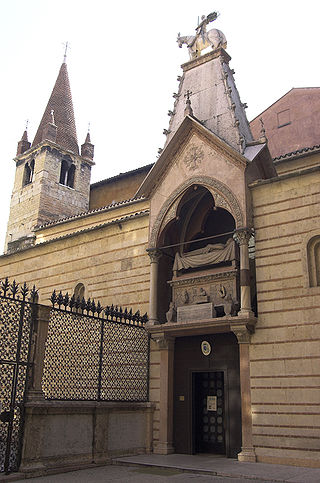
Santa Maria Antica is a Roman Catholic church in Verona, Italy. The current church is Romanesque in style and dates to 1185, rebuilt after the earthquake of 1117 destroyed the original building that dated back to the end of the period of Lombard domination in the 7th century. The only surviving remains of the 7th-century building is a fragment of black and white mosaic floor.

Jacopino della Scala, an Italian merchant and politician, was a member of the Scaliger family of future lords of Verona. He was the son of Leonardo della Scala, and also the grandson of Karafina Gambarelli and her husband Balduino della Scala, son of Arduino della Scala, who gave rise to the Della Scala dynasty
Napoleone della Torre, also known as Napo della Torre or Napo Torriani, was an Italian nobleman, who was effective Lord of Milan in the late 13th century. He was a member of the della Torre family, the father of Corrado della Torre and the brother of Raimondo della Torre.
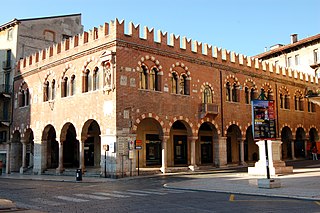
The Domus Mercatorum or Casa dei Mercanti is a medieval edifice at Piazza delle Erbe in Verona, northern Italy. During the Middle Ages it was home to the Casa dei Mercanti, the guild of the city's merchants, while today is home to the Banca Popolare di Verona.

The House of Bonacolsi was the name of an Italian noble family which ruled Mantua in the last quarter of the 13th century and the first quarter of the 14th. The Bonacolsi were the first lords of Mantua, preceding and creating the basis for the much more famous House of Gonzaga.

The Scaliger War was a conflict fought in 1336–1339 between the Scaliger lords of Verona, Mastino II della Scala and Alberto II della Scala, who had built an extensive territorial state in northern Italy, and a coalition of powers threatened by Scaliger expansion. These were chiefly the Republic of Venice, antagonized by the imposition of taxes on overland trade and the Scaligers' threat to end Venetian salt monopoly, and the Republic of Florence, which resented the Scaliger annexation of Lucca, that Florence had claimed for itself. After the first victories of the anti-Scaliger coalition, it was joined by Milan, Mantua, and Ferrara, who all had reasons to fear Scaliger ambitions. The turning point of the war was the end of Scaliger dominion over Padua in 1337, which became a separate, Venetian-influenced lordship under Marsilio da Carrara. The peace treaty, concluded at Venice on 24 January 1339, deprived Mastino II of most of his recent gains, reducing Scaliger domains to Verona and Vicenza. The annexation of Mestre and Treviso to Venice, however, marked the beginnings of the Venetian mainland state.













